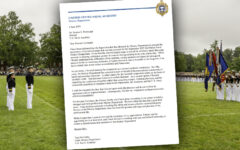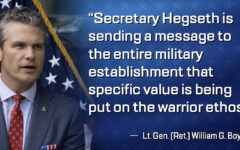Like Bud Light, The U.S. Navy Steps On A Rake With Drag Influencers
9 May 2023 2024-05-18 15:00Like Bud Light, The U.S. Navy Steps On A Rake With Drag Influencers
By Elaine Donnelly
President, Center for Military Readiness
The U.S. Navy has embarrassed itself again with news that is difficult to believe. On May 1, Micaela Burrow of The Daily Caller broke the news that the Navy chose a drag queen, Navy Yeoman 2nd Class Joshua Kelley, to be a recruiting “digital ambassador” in a six-month pilot program that ended in March.
The sailor’s Instagram page displays photos and TikTok videos of Kelley flashing between his uniform and glitzy drag outfits, multi-colored wigs, stage makeup, and burlesque poses. This is the same sailor that Navy Times photographed in 2018 performing a drag queen strip tease to entertain fellow crewmembers on the carrier Ronald Reagan.
This story is bigger than just the sailor/performer, stage name “Harpy Daniels.” It’s about the judgment of unnamed officials who chose a male drag queen as a Navy digital ambassador to potential recruits. Whoever came up with the idea should be held accountable and precluded from evaluating the results of the pilot program.
Congress Needs to Ask More Questions
Joint Chiefs Chairman Gen. Mark Milley and Defense Secretary Lloyd Austin have some explaining to do. At a recent hearing of the House Armed Services Committee, Rep. Matt Gaetz, R-Fla., asked Milley and Austin about drag queen performances on military bases and critical race theory (CRT) programs in Defense Department schools.
Milley claimed it was the first he’d heard about “that kind of stuff,” adding that he didn’t agree and “It shouldn’t be happening.” Gaetz thanked Milley for his admission and gave him a folder full of articles about drag queen performances on military bases.
Austin was evasive, but said for the record, “Listen, drag shows are not something that the Department of Defense supports or funds.” Congress should hold them to those assurances, but why is this happening?
As the Center for Military Readiness reported in February, a December 2022 revision in Defense Department regulations regarding persons identifying as transgenders (DoDI 1300.28) specifically authorized on-duty, on-base cross-dressing options for personnel preparing to transition.
This permissive policy goes beyond Obama-era rules, which permitted “real life experience” (RLE) cross-dressing only while off-duty and off-base. CMR correctly predicted that this change could increase numbers of cross-dressing drag queen performers (who are not necessarily transgender) performing on military bases.
‘Equity’ in Sexual Expression?
The videos of Yeoman Kelley in drag are expressions of his sexuality, but this type of adult entertainment is no more acceptable on a military ship or base than a minstrel show would be. Whether intended or not, such performances are based on a form of cultural appropriation that stereotypes and disrespects women.
Questions about “equity” complicate matters. If Kelley can perform strip dances on ships or military bases, why shouldn’t Navy women be allowed to lift morale by expressing their own sexuality in the same glitzy-costumed way?
The month of June is fast approaching. Defense Department-encouraged events celebrating “LGBT Pride” month at various military bases have included hyper-sexual drag queens performing outlandish routines for adults and “family friendly” story hours for the children of military parents.
Policymakers should pause and consider whether drag shows on military bases improve discipline and readiness or make chronic problems of sexual misconduct worse.
As for the Navy’s first drag queen digital ambassador, the future appears bright. Kelley’s drag queen strip tease on the carrier Ronald Reagan, done in a wig, tights, and red heels, was not a one-time event. One of Kelley’s stated lifetime goals is to compete on the popular TV program, “RuPaul’s Drag Race.”
Kelley was not compensated for being a Navy digital ambassador, but his special status likely is a big showbiz break. Media exposure could lead to book deals and ESG-score-influenced advertising gigs more lucrative than any compensation the Navy could offer. Just ask girl impersonator and Bud Light endorser Dylan Mulvaney.
When Bud Light engaged Mulvaney as their social media influencer, the beer brand’s market share plunged by a staggering 17 percent. It doesn’t matter if consumers spend their beer dollars elsewhere, but it does matter when the Navy loses its share of the recruiting market.
Vice Admiral Lisa Franchetti recently testified that the Navy expects to end up 8,000 sailors short of its recruiting goal this year. Storm clouds are gathering over the Pacific, ships are being scrapped for lack of maintenance, and Iranian speedboats recently seized two oil tankers in the Gulf. This is no time for distractions from the sea service’s primary purpose — defending America from multiple threats.
Congress Must Intervene
A recent independent, high-tech survey on the politicization of the military done by the Heritage Foundation found that among active-duty respondents, 80 percent said the “changing of policy to allow unrestricted service by transgender individuals” decreased their trust in the military.
The trendy word now is “non-binary,” but the Defense Department cannot explain its meaning. Is there a third biological sex, or is this an illusion layered on like stage makeup? People can change their clothing, behavior, or appearance, but human chromosomes remain unchanged.
The issue is not about one sailor having fun or whether others enjoy his performances. It’s about the judgment of whoever thought that using a sailor/drag queen with videos on TikTok — a Chinese-owned platform known to be a national security threat — would be a great way to recruit young men and women for the Navy.
Congress should intervene because this is not a laughing matter, unless you are a Chinese ship captain preparing to blockade Taiwan.
Wokeism in the military hurts an institution by taking leftist ideology to extremes. Under lax Biden administration rules, sexualized performances that weaken military culture could proliferate on many military bases, Defense Department schools, and all the ships at sea.
Congress should demand accountability from policymakers who don’t understand the importance of military culture. “Dignity and respect” should include discipline, selflessness, and undiminished focus on missions that protect national security in a dangerous world.
Elaine Donnelly is President of the Center for Military Readiness, an independent public policy organization that reports on and analyzes military and social issues.






























